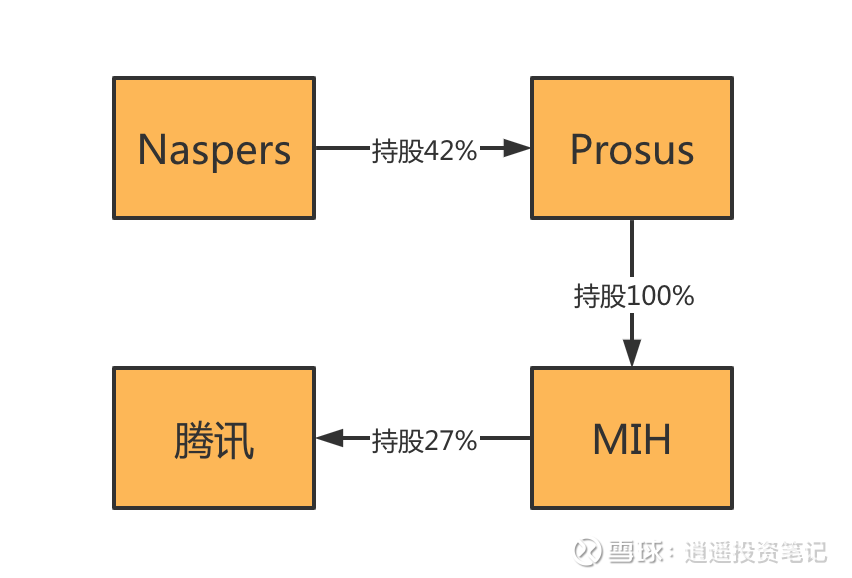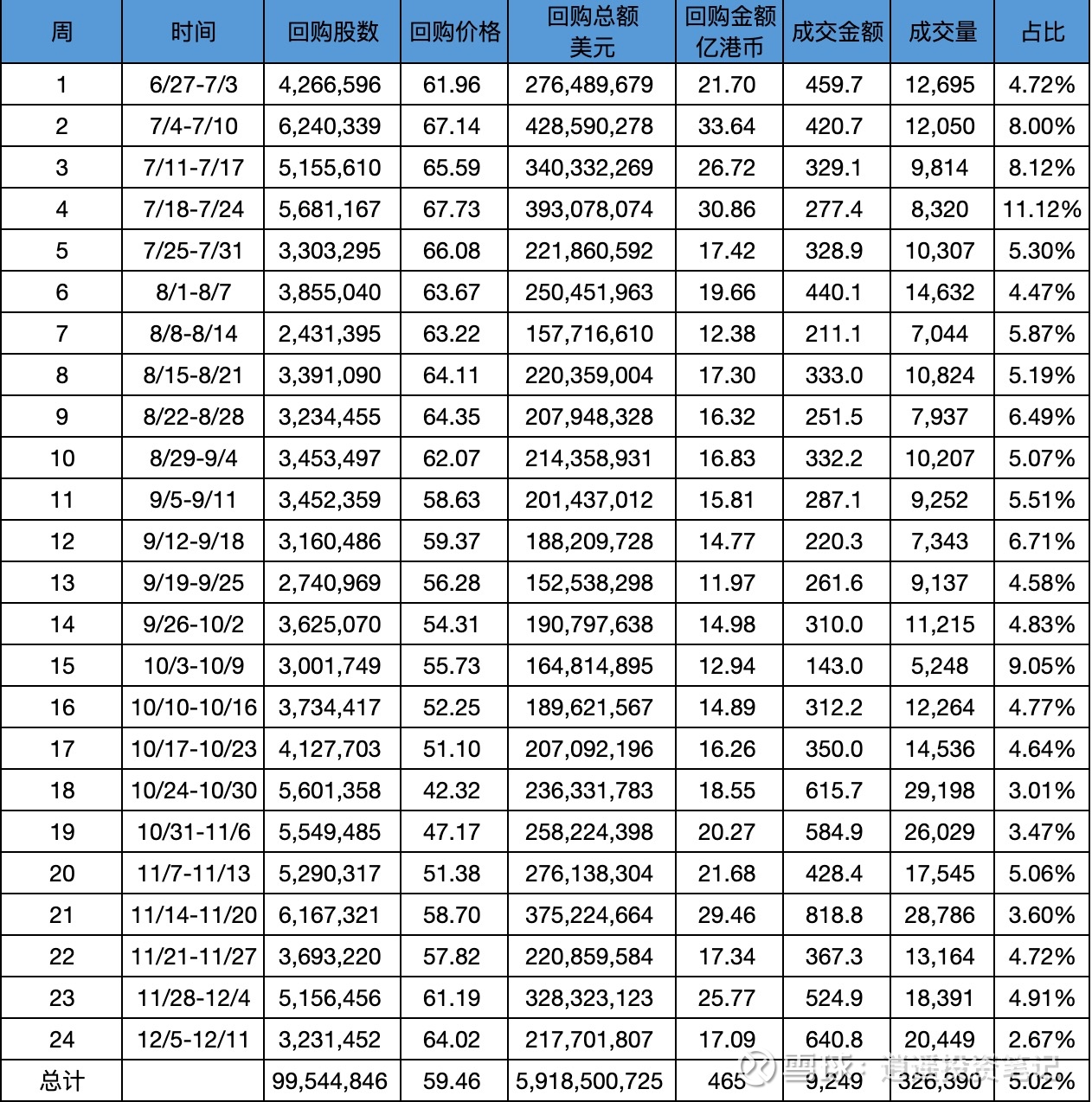Last Friday, Prosus, a major shareholder of Tencent, announced the latest progress in its shareholding reduction on its official website:

That is to say, since June 28 when Tencent began to reduce its shareholding, Prosus’s latest shareholding ratio has been reduced to 26.99%. I posted yesterday and estimated that this ratio will be reached next week, but the result is ahead of schedule. It seems that Prosus’s shareholding reduction is faster than I expected. a little faster.
Today we will systematically summarize the shareholding reduction of Tencent’s major shareholders, including the reasons for the shareholding reduction, the number of shareholding reductions this time, the number of historical shareholding reductions, guesses about subsequent shareholding reduction plans, and so on.
1. The relationship between major shareholders of Tencent:

The above three are major shareholders of Tencent, so the general mention of major shareholders of Tencent on the Internet can be understood as Prosus and Naspers. For example, this time Tencent’s major shareholder’s shareholding reduction and repurchase plan refers to the respective repurchases of Prosus and Naspers.
The shareholding structure among the major shareholders of Tencent is the most complicated situation I have seen so far. For example, Naspers holds 42% of Prosus and is the major shareholder of Prosus; at the same time, Prosus holds 49% of Naspers and is also the major shareholder of Naspers. This is only part of the complexity, and there are more complex ones. I will have a chance to pick them up later, so I won’t go into details today.
2. Reasons for shareholding reduction:
Last week, I published an article analyzing this issue in detail. For the original text, see: Tencent’s Major Shareholder Reduction Miracle: The more the major shareholders reduce their holdings, the more shares they hold .
Here are just a few words: due to the long-term undervaluation of the stock prices of Prosus and Naspers, for example, the current PB of Prosus is only about 0.65, which means that the market value is only about 65% of the net assets. In this case, Prosus reduced its holdings in Tencent to repurchase its own shares. As a shareholder of Prosus, the Tencent shares held indirectly will not decrease, but will increase instead. The same goes for Naspers repo. Therefore, in this case, reducing the holding of Tencent and repurchasing its own shares is a risk-free arbitrage.
3. Ways of shareholding reduction and repurchase:
Prosus: The repurchase funds come from the reduction of Tencent’s shares, and the repurchase amount is basically equal to the reduction amount. It can probably be understood that after the reduction of Tencent’s holdings, the funds obtained will be used for repurchases immediately. Therefore, how much money Prosus has cashed out by reducing its holdings in Tencent can be estimated through the weekly repurchase amount on Prosus official website.
Naspers: The repurchase funds come from the reduction of Prosus shares. When the repurchase plan was announced, Naspers held about 42% of Prosus’s shares. Since Prosus has been repurchasing and canceling its own shares and reducing the total share capital, the proportion of Prosus held by Naspers will get higher and higher. So Naspers made a decision: every time Prosus repurchases 100 shares of its own shares, Naspers will reduce its holdings of 42 Prosus shares. The shareholding ratio will remain unchanged at 42%. Through this plan, Naspers has reduced its holdings of about 30 million Prosus shares from the end of June to the present, cashing out about US$2 billion. As of last week, Naspers had spent a total of about US$1.7 billion on repurchases, which was equivalent to the amount cashed out.
4. Details of this shareholding reduction plan:

Three points in time:
June 27: When announcing the shareholding reduction plan, the number of shares held was 2.769 billion shares, with a shareholding ratio of 28.86%.
September 8: The shareholding ratio was reduced to 27.99%, with 2.692 billion shares held.
December 13: The shareholding ratio was reduced to 26.99%, and the number of shares held was 2.589 billion shares.
Therefore, the cumulative number of reductions in this shareholding reduction plan = 180,722,700 shares.
The amount of cash out this time = 226 + 245 = 47.1 billion Hong Kong dollars.
The average price of reduction = 471/1.8 = 261 Hong Kong dollars.
Note: The number of reduced shares can be calculated based on the total share capital and shareholding ratio; the total amount of reduced holdings can only be based on the total estimated repurchase by Prosus during this period, and there will be errors.
5. Prosus weekly reduction data:

The above are the details of Prosus’ weekly holding reduction data.
From the beginning of the shareholding reduction repurchase plan to last Friday, Prosus spent a total of 5.918 billion US dollars (46.5 billion Hong Kong dollars) to repurchase 99.54 million of its own shares, with an average repurchase price of 59.46 US dollars.
As of last Friday, Tencent’s cumulative trading volume was 3.2639 billion shares, with a total turnover of 924.9 billion Hong Kong dollars.
Prosus reduced its cash holdings (estimated based on total repurchases) to 46.5 billion Hong Kong dollars, accounting for 5.02% of Tencent’s cumulative turnover. That is to say, in terms of the overall reduction scale, it is basically in line with the ratio stated in Prosus’ original announcement on the reduction of holdings: the daily reduction amount accounts for 3%-5% of Tencent’s turnover.
6. Subsequent shareholding reduction plan:
The Prosus shareholding reduction plan defines this shareholding reduction and repurchase plan as “open”, that is, there is no upper limit target for shareholding reduction/repurchase. If the discount ratio between market value and net assets maintains the current gap of 30%+, the repurchase plan will continue, and Tencent’s reduction of holdings will continue.
In addition, we can pay attention to a trend:
Prosus September 9 announcement: In addition, as part of the continuation of the repurchase program, Prosus has taken administrative measures to deposit an additional 192 million Tencent shares it holds in the form of certificates into the Hong Kong Central Clearing and Settlement System.
That is to say, after September 9th (holding 2.692 billion shares), the 192 million shares transferred in are the 192 million shares transferred in this time. After the reduction of 192 million shares transferred in this time (2.5 billion shares), if Prosus continues to The transfer of shares to the settlement system may mean that the reduction of holdings will continue. If there is no transfer of the reduction of holdings, it may be terminated, but this is only a guess. In the future, we can observe the actions of Prosus after reducing its holdings of 88 million shares. In view of the repurchase so far, the difference between the market value of Prosus and its net assets has not decreased significantly, so I personally feel that after reducing its holdings to 2.5 billion shares, Prosus It is likely that the reduction will continue.
7. The impact of shareholding reduction:
This issue has been mentioned many times in previous articles: the reduction of holdings does not affect the fundamentals of Tencent at all, and the reduction of holdings is only a risk-free arbitrage behavior of major shareholders, not that they are not optimistic about Tencent.
From the perspective of investment value, if Tencent’s stock price has been unable to increase due to the reduction of holdings, it will be a good thing for shareholders who hold Tencent for a long time, because Tencent will most likely maintain a daily repurchase rate of 350 million. From the point of view that repurchases are equivalent to dividends, Tencent repurchases 350 million yuan a day, which is equivalent to about 3.5 cents per day for every share of Tencent held. If you hold 10,000 shares of Tencent, Tencent repurchases the equivalent of Give you a dividend of 350 yuan. Therefore, for shareholders who are optimistic about Tencent in the long term and hold Tencent for a long time, it is beneficial for major shareholders to reduce their holdings. Of course, for those who only hold Tencent for a short period of time, reducing their holdings is definitely not good. So different people have different feelings and opinions. I personally hold a neutral attitude. Of course I am happy that Tencent has risen. If Tencent does not rise, the more shares that have been repurchased and canceled, I am also happy. The current overall holding position is not bad.
$Tencent Holdings(00700)$ $Kweichow Moutai(SH600519)$ $Apple(AAPL)$ @今日读论#腾讯大故事控制#
There are 7 discussions on this topic in Xueqiu, click to view.
Snowball is an investor social network where smart investors are all here.
Click to download Xueqiu mobile client http://xueqiu.com/xz ]]>
This article is transferred from: http://xueqiu.com/6490468241/238179894
This site is only for collection, and the copyright belongs to the original author.